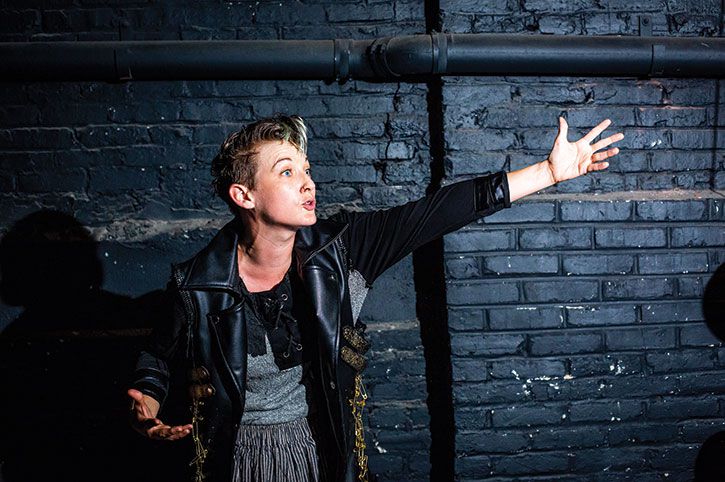
An Iliad by Lisa Peterson and Denis O’Hare, directed by Rebecca Wright at the Arden Theatre, Philadelphia, through December 15, 2019.
One of Philadelphia’s best actors, Mary Tuomanen, gives a bravura performance in the Arden Theatre’s production of An Iliad.
Tuomanen’s portrayal is the essence of classical Greek drama. Her voice intones the tragic story as her body expresses its emotions. Primitive chanting and wailing highlight her feelings.
This is interspersed with turns to the audience for approval, with raised eyebrow and nodding head, as if seeking our recognition that we are relating to her message. Drum beats by Jordan McCree reinforce the primordial character of the production.
This is a modern re-interpretation of Homer’s epic story about the Trojan war, based on his Iliad as translated by the late professor and poet Robert Fagles. Lisa Peterson and Denis O’Hare condensed Homer’s epic in 2012 and couched it in modern terms.
The title is apt, as it stresses the fact that there is no one singular version that could be called The Iliad. Instead, this is one of many different re-tellings.
Now, Tuomanen’s is not the only approach to the subject. Just a block away, two months ago, a Fringe Festival production of the same play took a quieter, folksier approach that’s equally valid. Jason Greenfield stepped into the room as if he were a wandering minstrel who just happened upon us, and proceeded to take us into his confidence.
Homer’s devices of repetition and incantation give power to the play, as he adds the names of modern wars to the bard’s ancient list. It’s her mission, she tells us, to recount the story to each new generation, until humanity abandons its continual acts of violence.
Tuomanen as the Poet spins a tale how a coalition of Greek armies waged war against the city of Troy because Prince Paris stole the affections of Helen, the queen of Sparta. Achilles’ slays Hector, the leader of the Trojan army, in a battle that’s described in searing detail. This is a tragedy because Hector was a noble prince who had opposed the war.
Rebecca Wright’s direction vividly demonstrates that wars are continually waged by the powerful who use ordinary humans as fodder, and these wars have dehumanizing effects.